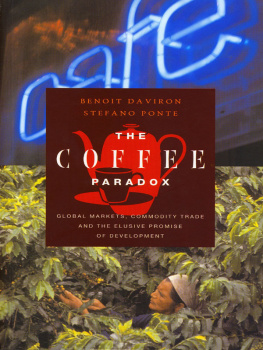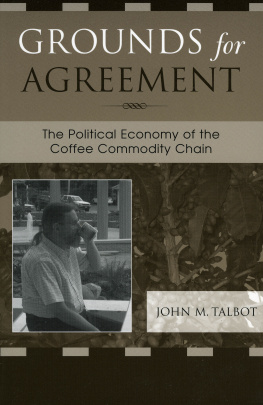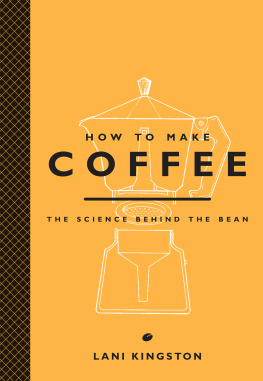
About this book
Can developing countries trade their way out of poverty? International trade has grown dramatically in the last two decades in the global economy, and trade is an important source of revenue in developing countries. Yet, many low-income countries have been producing and exporting tropical commodities for a long time. They are still poor. This book is a major analytical contribution to understanding commodity production and trade, as well as putting forward policy-relevant suggestions for solving the commodity problem.
Through the study of the global value chain for coffee, the authors recast the development problem for countries relying on commodity exports in entirely new ways. They do so by analysing the so-called coffee paradox - the coexistence of a coffee boom in consuming countries and of a coffee crisis in producing countries. New consumption patterns have emerged with the growing importance of specialty, fair trade and other sustainable coffees. In consuming countries, coffee has become a fashionable drink and coffee bar chains have expanded rapidly. At the same time, international coffee prices have fallen dramatically and producers receive the lowest prices in decades.
This book shows that the coffee paradox exists because what farmers sell and what consumers buy are becoming increasingly different coffees. It is not material quality that contemporary coffee consumers pay for, but mostly symbolic quality and in-person services. As long as coffee farmers and their organizations do not control at least parts of this immaterial production, they will keep receiving low prices. The Coffee Paradox seeks ways out from this situation by addressing some key questions: What kinds of quality attributes are combined in a coffee cup or coffee package? Who is producing these attributes? How can part of these attributes be produced by developing country farmers? To what extent are specialty and sustainable coffees achieving these objectives?
About the authors
Benoit Daviron is a French economist at the Centre de coopration internationale en recherche agronomique pour le dveloppement (CIRAD), in Montpellier. He has published widely on issues of food policy, trade in foodstuffs, as well as tropical commodity chains, international agreements and agriculture in developing countries. He has been a Visiting Scholar at the University of California, Berkeley.
Stefano Ponte is Senior Researcher at the Danish Institute for International Studies, Copenhagen. He is co-author (with Peter Gibbon) of Trading Down: Africa, Value Chains and the Global Economy (Temple University Press, 2005) and author of Farmers and Markets in Tanzania: How Policy Reforms Affect Rural Livelihoods in Africa (James Currey, 2002). He has published extensively on commodity trade (especially coffee) and development, global value chains, the political economy of standards, agro-food markets, and rural livelihoods in developing countries.
The Coffee Paradox
Global markets, commodity trade and
the elusive promise of development
Benoit Daviron and Stefano Ponte

ZED BOOKS
LONDON & NEW YORK
The Coffee Paradox was first published in 2005 by Zed Books Ltd, 7 Cynthia Street, London N1 9JF, UK and Room 400, 175 Fifth Avenue, New York, NY 10010, USA
This ebook edition was first published in 2013
www.zedbooks.co.uk
Copyright Benoit Daviron and Stefano Ponte 2005
The right of Benoit Daviron and Stefano Ponte to be identified as the authors of this work has been asserted by them in accordance with the Copyright, Designs and Patents Act, 1988
Cover designed by Andrew Corbett
Set in 10.5/13 pt Bembo by Long House, Cumbria, UK
All rights reserved. No part of this publication may be reproduced, stored in a retrieval system or transmitted in any form or by any means, electronic, mechanical, photocopying or otherwise, without the prior permission of Zed Books Ltd.
A catalogue record for this book
is available from the British Library
US Cataloging-in-Publication Data
is available from the Library of Congress
ISBN 978 1 84813 629 8
Contents
Commodity trade, development and global value chains
Whats in a cup? Coffee from bean to brew
Markets, contracts and grades
Who calls the shots? Regulation and governance
Is this any good? Material and symbolic production of coffee quality
For whose benefit? Sustainable coffee initiatives
Value chains or values changed?
A way forward
Tables, figures and boxes
Tables
Figures
Boxes
Abbreviations
| AAFN | alternative agro-food network |
| ABA | American Birding Association |
| ACE | Alliance of Coffee Excellence |
| ACP | AfricaCaribbeanPacific (countries) |
| ACPC | Association of Coffee Producer Countries |
| AOC | Appellation dOrigine Contrle |
| ATO | alternative trade organization |
| CAFE | Coffee and Farmer Equity Practices Programme |
| CAP | Common Agricultural Policy |
| CBK | Coffee Board of Kenya |
| CDR | Centre for Development Research (Copenhagen) |
| CEPCO | Coordinadora Estatal de Productores de Caf (Oaxaca, Mexico) |
| CFC | Common Fund for Commodities |
| cif | cost, insurance, freight (as being included in the price) |
| CIRAD | Centre de Coopration Internationale en Recherche |
| Agronomique pour le Dveloppement |
| CMB | Coffee Marketing Board |
| CQI | Coffee Quality Institute |
| CQP | Coffee Quality Improvement Programme |
| CSCE | (New York) Coffee, Sugar and Cocoa Market |
| CTA | Coffee and Tea Authority (Ethiopia) |
| DFID | Department for International Development (UK) |
| DOC | Denominazione di Origine Controllata |
| ECEA | Ethiopian Coffee Exporters Association |
| EPZ | export-processing zone |
| EU | European Union |
| EUREPGAP | European Retailer Group Good Agricultural Practices |
| FAO | Food and Agriculture Organization |
| Fedecaf | Federacin Nacional de Cafeteros de Colombia |
| FLO | Fair Trade Labelling Organizations International |
| fob | free on board (cost exclusive of freight and insurance) |
| GATT | General Agreement on Tariffs and Trade |
| GCC | global commodity chain |
| GDP | gross domestic product |
| GLAF | Globalization and Economic Restructuring in Africa |
| GVC | global value chain |
| HACCP | Hazard Analysis and Critical Control Point |
| IBC | Instituto Brasileiro do Caf |
| ICA | international coffee agreement |
| ICO | International Coffee Organization |
| IFAD | International Fund for Agricultural Development |
| IFOAM | International Federation of Organic Agriculture Movements |
| IGO | indication of geographical origin |
| IIED | International Institute for Environment and Development |
Next page












